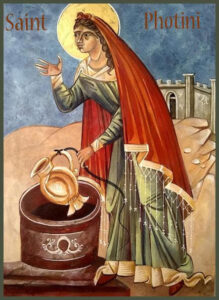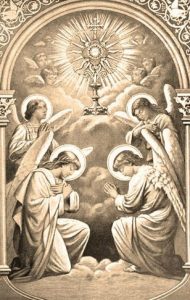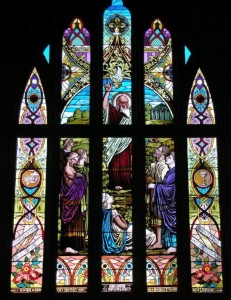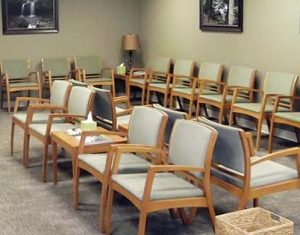 Today, by translation from Thursday, the 1st of November, we celebrate the Feast of All Saints.
Today, by translation from Thursday, the 1st of November, we celebrate the Feast of All Saints.
All my life as an Episcopalian (we didn’t have All Saints Day in the churches where I spent my childhood), I’ve been told that this day is about remembering all the saints who didn’t get a day of their own. Sure, we include Hildegarde and Francis and Richard Hooker and all those other folks with a feast day, but it’s really about those of whom the Book of Sirach says “there is no memory; they have perished as though they had never existed,” although they “also were godly [people], whose righteous deeds have not been forgotten.”[1] All Saints Day (and, thus, this Sunday) is a Christian festival celebrated in honor of all the saints, known and unknown, and frankly more in honor of the unknowns. It acknowledges the powerful spiritual bond between those in heaven (those we call the “Church triumphant”) and those of us still here on earth (we who make up the “Church militant”).
I’ve also been told, as I’m sure you have, that included in this commemoration are all the baptized who have ever lived and died. After all, the Catholic faith teaches that all faithful Christians are saints. St. Paul addressed his correspondence that way: for example, “To the saints who are in Ephesus…”[2] or “To the saints and faithful brothers and sisters in Christ in Colossae…”[3] So we are paying tribute to all departed baptized Christians.
Which is great, but then I am left wondering what November 2 is all about… If All Saints is about all those dead baptized Christians, what makes it different from the feast the next day that we call “All Souls” or the “Feast of All the Faithful Departed”? Why do we even have that day if that’s what All Saints Day is about. There must be something about All Saints that makes it different. According to one source, All Saints is about those dead who are believed to be already in heaven, while “All Souls was created to commemorate those who died baptized but without having confessed their sins, and thus they are believed to reside in purgatory.”[4]
Continue reading
 We “boast in our sufferings,” writes Paul to the Romans, “knowing that suffering produces endurance, and endurance produces character, and character produces hope, and hope does not disappoint us….”[1] It sounds, doesn’t it, like Paul is encouraging the Romans to brag about their problems and how well they handle them, as if endurance, character, and hope were the prizes handed out in some sort of “affliction Olympics.”
We “boast in our sufferings,” writes Paul to the Romans, “knowing that suffering produces endurance, and endurance produces character, and character produces hope, and hope does not disappoint us….”[1] It sounds, doesn’t it, like Paul is encouraging the Romans to brag about their problems and how well they handle them, as if endurance, character, and hope were the prizes handed out in some sort of “affliction Olympics.” A book entitled Stories for the Heart was published a few years ago by inspirational speaker Alice Gray. It is a compilation of what Gray calls “stories to encourage your soul;” one of them is the following story, whose original author she says is unknown. It may not be true, but I (for one) hope it is:
A book entitled Stories for the Heart was published a few years ago by inspirational speaker Alice Gray. It is a compilation of what Gray calls “stories to encourage your soul;” one of them is the following story, whose original author she says is unknown. It may not be true, but I (for one) hope it is: With churches suspending public worship out of concern for the contagion of Covid-19, the noval coronavirus, we Episcopalians (and many others) are prevented from receiving Holy Communion. An ancient practice of the Church in such circumstances, for there have always been those who, for whatever reason, are unable to take the Sacrament, is to make an act of “spiritual communion.”
With churches suspending public worship out of concern for the contagion of Covid-19, the noval coronavirus, we Episcopalians (and many others) are prevented from receiving Holy Communion. An ancient practice of the Church in such circumstances, for there have always been those who, for whatever reason, are unable to take the Sacrament, is to make an act of “spiritual communion.”  Lenten Journal, Day 32 – 5th Sunday in Lent
Lenten Journal, Day 32 – 5th Sunday in Lent Lenten Journal, Day 12
Lenten Journal, Day 12 Today, by translation from Thursday, the 1st of November, we celebrate the Feast of All Saints.
Today, by translation from Thursday, the 1st of November, we celebrate the Feast of All Saints. Today is the first Sunday in November which means that instead of the normal sequence of lessons for Ordinary Time, we are given the option of reading the lessons for All Saints Day, which falls every year on November 1. So today we heard a reading from the Wisdom of Solomon (a part of the apocrypha in which we hear that the righteous are in the hand of God), a psalm reminding us that the saints pledge themselves to truth rather than falsehood, a bit of the Book of Revelation describing the “new Jerusalem” where God will make God’s home with the saints, and (oddly enough) to the story of the raising of Lazarus in John’s Gospel.
Today is the first Sunday in November which means that instead of the normal sequence of lessons for Ordinary Time, we are given the option of reading the lessons for All Saints Day, which falls every year on November 1. So today we heard a reading from the Wisdom of Solomon (a part of the apocrypha in which we hear that the righteous are in the hand of God), a psalm reminding us that the saints pledge themselves to truth rather than falsehood, a bit of the Book of Revelation describing the “new Jerusalem” where God will make God’s home with the saints, and (oddly enough) to the story of the raising of Lazarus in John’s Gospel.

